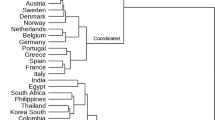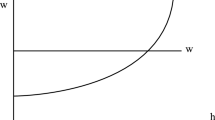Abstract
This paper assesses the consequences of a high degree of international capital mobility for the behavior of governments. It is argued that countries can be seen as clubs where the government as club management acts as an entrepreneur attempting to attract internationally mobile resources. Within this stylized model it is shown that competition induces the government of a small democratic country to implement policy reforms that increase the welfare of domestic residents if it wants to be reelected. This result suggests that international openness may be a substitute for more overt attempts to contain a government's Leviathan tendencies such as constitutional amendments. Finally, the case against competition among governments is analyzed from the perspective of the club model developed in the paper.
Similar content being viewed by others
References
Barro, R.J. (1989) “The Neoclassical Approach to Fiscal Policy.” In: R.J. Barro (ed)Modern Business Cycle Theory. Cambridge: Harvard University Press: 178–235.
Bhagwati, J. (1989) “Is Free Trade Passé After All?”Weltwirtschaftliches Archiv 125: 17–44.
Bishop, G., Damran, D., and Miller, M. (1989)1992 and Beyond: Market Discipline CAN Work in the EC Monetary Union. London: Salomon Brothers.
Brennan, G. and J.M. Buchanan (1980)The Power to Tax. Analytical Foundations of a Fiscal Constitution. Cambridge: Cambridge University Press.
Breton, A. (1987) “Towards a Theory of Competitive Federalism.”European Journal of Political Economy 3: 263–329.
Buchanan, J.M. (1959) “Positive Economics, Welfare Economics, and Political Economy.”Journal of Law and Economics 2: 124–138.
Cauley, J., Sandler, T., and Cornes, R. (1986) “Nonmarket Institutional Structures: Conjectures, Distribution, and Allocative Efficiency.”Public Finance 41: 153–171.
Connolly, M. (1970) “Public Goods, Externalities, and International Relations.”Journal of Political Economy 78: 279–290.
Demsetz, H. (1969) “Information and Efficiency: Another Viewpoint.”The Journal of Law and Economics 12: 1–22.
Giersch, H. (1960) “Liberalismus, Dirigismus und die wirtschaftliche Integration Europas.” In: M. Bye et al. (eds)Europas Wirtschaftseinheit von morgen. Schriftenreihe zum Handbuch für europäische Wirtschaft 15. Baden-Baden: Verlag August Lutzeyer: 97–125.
Giersch, H. (1981) “Schumpeter and the Current and Future Development of the World Economy.” In: H. Frisch (ed)Schumpeterian Economics. Eastbourne: Praeger: 49–59.
Gordon, R.H. (1983) “An Optimal Taxation Approach to Fiscal Federalism.”Quarterly Journal of Economics 98: 567–586.
Hayek, F.A. v. [1984 (1968)] “Competition as a Discovery Procedure”. In: C. Nishiyama, K.R. Leube (eds)The Essence of Hayek. Stanford: Hoover Institution Press: 254–265.
Hirschman, A.O. (1981) “Exit, Voice, and the State.” In: Hirschman, A.O.Essays in Trespassing. Economics to Politics and Beyond. Cambridge: Cambridge University Press: 246–265.
List, F. (1841)Das nationale System der politischen Oekonomie. Erster Band:Der internationale Handel, die Handelspolitik und der deutsche Zollverein. Stuttgart: J.G. Cotta'scher Verlag.
McKenzie, R.B. and D.R. Lee (1991)Quicksilver Capital. How The Rapid Movement of Wealth Has Changed the World. New York: The Free Press.
McLure, C.E. (1986) “Tax Competition: Is What's Good for the Private Goose also Good for the Public Gander?”National Tax Journal 39: 341–348.
Oates, W.E. (1972)Fiscal Federalism. New York: Harcourt Brace Jovanovich.
Olson, M. (1986) “Toward a More General Theory of Government Structure.”American Economic Review 76 (Papers and Proceedings): 120–125.
Rowley, C.K. and A.T. Peacock (1975)Welfare Economics. A Liberal Restatement. London: Martin Robertson.
Salmon, P. (1991) “Checks and Balances and International Openness.” In: A. Breton, G. Galeotti, P. Salmon, and R. Wintrobe (eds)The Competitive State: Villa Colombella Papers on Competitive Politics. Dordrecht: Kluwer Academic Publishers: 169–184.
Samuelson, P.A. (1972) “Indeterminacy of Governmental Role in Public-Good Theory.” In: R.C. Merton (ed)The Collected Scientific Papers of Paul A. Samuelson. Vol.III. Cambridge: The M.I.T. Press: 521.
Sandler, T., Cauley, J., and Tschirhart, J. (1983) “Toward a Unified Theory of Nonmarket Institutional Structures.”Australian Economic Papers 22: 233–254.
Scheide, J. and S. Sinn (1989) “How Strong is the Case for International Coordination?” In: J.A. Dorn and W.A. Niskanen (eds)Dollars, Deficits, and Trade. Boston: Kluwer Academic Publishers: 397–422.
Schumpeter, J.A. [1954 (1918)]Die Krise des Steuerstaates. Translated asThe Crisis of the Tax State by W.F. Stolper and R.A. Musgrave. International Economic Papers 4: 5–38.
Sinn, H.W. (1990) “Tax Harmonization and Tax Competition in Europe.”European Economic Review 34: 489–504.
Smith, A. [1981 (1776)]An Inquiry into the Nature and Causes of the Wealth of Nations. Glasgow Edition of the Works and Correspondence of Adam Smith 2. Indianapolis: Liberty Press.
Stigler, G.J. (1972) “Economic Competition and Political Competition.”Public Choice 13: 91–106.
Tiebout, C.M. (1956) “A Pure Theory of Local Expenditures.”Journal of Political Economy 64: 416–424.
Tullock, G. (1970)Private Wants, Public Means. An Economic Analysis of the Desirable Scope of Government. New York and London: Basic Books.
Tullock, G. (1984) “A (Partial) Rehabilitation of the Public Interest Theory.”Public Choice 42: 89–99.
Vaubel, R. (1983) “Coordination or Competition among National Macroeconomic Policies?” In: F. Machlup et al. (eds)Reflections on a Troubled World Economy. Essays in Honor of Herbert Giersch. New York: St. Martin's Press: 3–28.
Vaubel, R. (1985) “International Collusion or Competition For Macroeconomic Policy Coordination? A Restatement.”Recherches Economiques de Louvain 51: 223–240.
Viner, J. [1952 (1931)] “Cost Curves and Supply Curves.” In: K.E. Boulding, G.J. Stigler (eds)Readings in Price Theory. Chicago: Richard D. Irwin: 198–232.
Author information
Authors and Affiliations
Additional information
An earlier version of this paper appeared as Kiel Working Paper No. 458. The author would like to thank Hartmut Kliemt, Werner Pommerehne, Helmut Reisen, Pierre Salmon, Horst Siebert, Viktor Vanberg as well as seminar participants at the University of Munich, the Free University of Berlin, the OECD Development Centre in Paris and at the 1991 meeting of the European Public Choice Society in Beaune for helpful comments. All remaining errors are mine.
Rights and permissions
About this article
Cite this article
Sinn, S. The taming of Leviathan: Competition among governments. Constit Polit Econ 3, 177–196 (1992). https://doi.org/10.1007/BF02393119
Issue Date:
DOI: https://doi.org/10.1007/BF02393119




